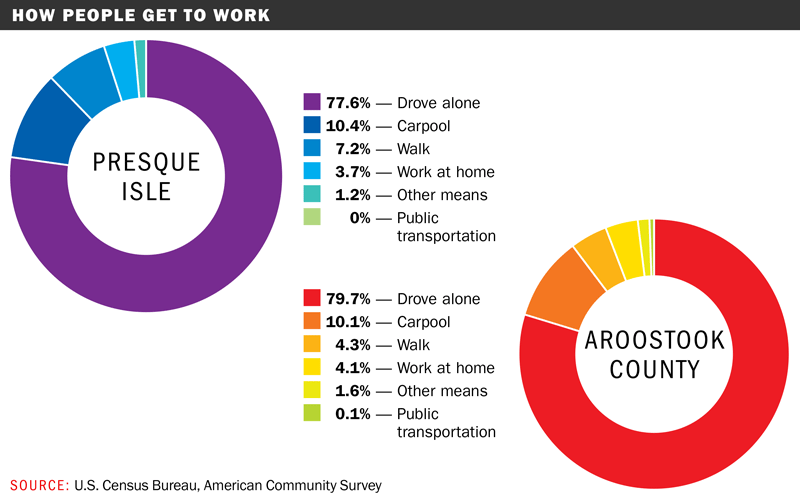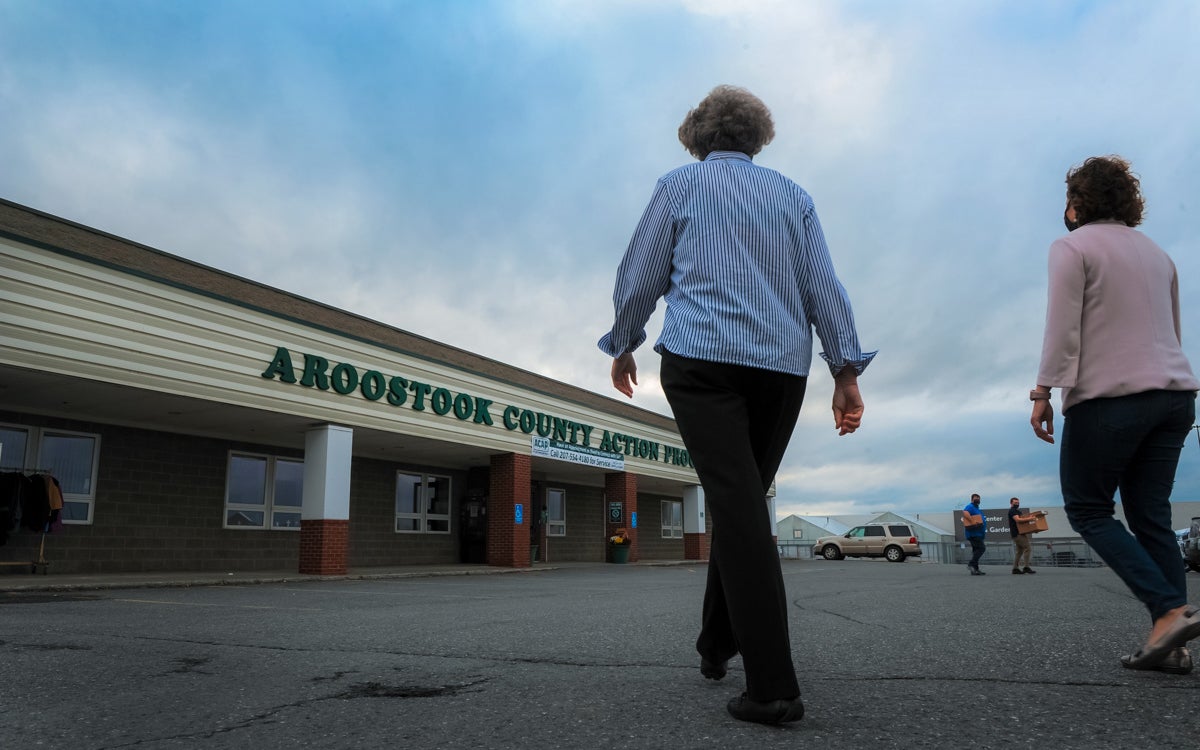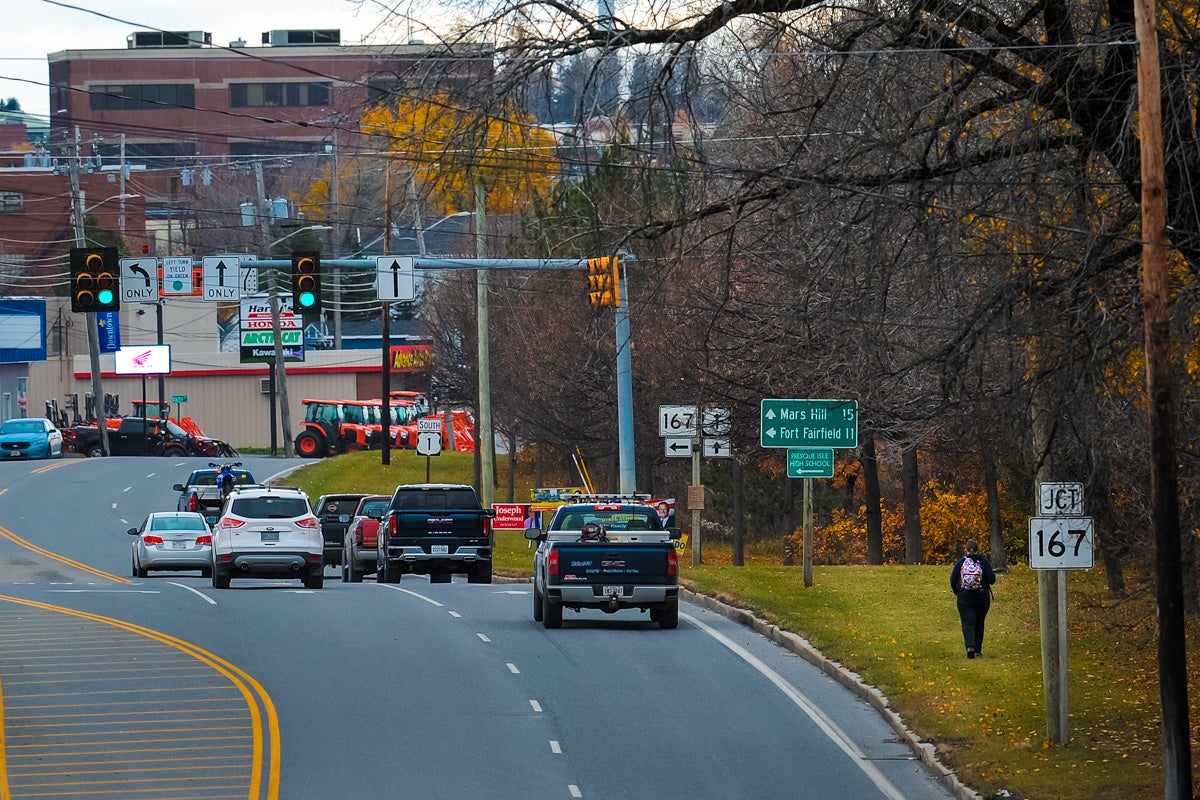Lack of transportation, including public transit, is a top concern of residents in Aroostook County. The situation also affects employers who rely on them to get to work each day. It’s a complex problem, and The County is trying to come up with a solution.
Get Instant Access to This Article
Subscribe to Mainebiz and get immediate access to all of our subscriber-only content and much more.
- Critical Maine business news updated daily.
- Immediate access to all subscriber-only content on our website.
- Bi-weekly print or digital editions of our award-winning publication.
- Special bonus issues like the Mainebiz Book of Lists.
- Exclusive ticket prize draws for our in-person events.
[bypass-paywall-buynow-link link_text="Click here to purchase a paywall bypass link for this article"].
In the Aroostook County town of Mars Hill, population 1,462, Pineland Farms Potato Co. is a major employer.
Just over 200 people work at the company’s potato processing facility, which transforms thousands of acres of potatoes grown in the region into ready-to-cook products. Some live nearby, but many travel an hour or more from their homes to reach work.
The problem is, some employees don’t have cars or even a license.
“Those who don’t have a vehicle or a valid driver’s license are car-pooling if they can,” says Laurie Nelson, HR manager at Pineland Farms Potato.
Some have occasionally used taxis, but that’s expensive.
“A couple of weeks ago, I had an individual we were moving forward to hire,” she says. “But he needed to pull his application because he didn’t have transportation.”
Lack of transportation, including public transit, has been cited as the top concern of some 1,000 residents who participated in a recent community study conducted by the Aroostook County Action Program, a nonprofit services and resources provider based in Presque Isle.
The need is widespread and includes the working poor, the elderly and young families.
The result of the study was surprising to some, says Jamie Chandler, the nonprofit’s COO.
“I don’t think people understood that there are so many individuals who don’t have access to vehicles,” she says.
Sheer distance
The situation affects residents in complex ways. One-vehicle families may experience difficulties accessing or retaining employment if more than one person is working or job hunting. Car-pooling can be tricky if the vehicle owner is sick, on vacation or on a different shift. Seniors might not have family or friends to take them to medical appointments, shopping or social outings.
Jay Kamm, a senior planner at Northern Maine Development Commission in Caribou, estimates 10% to 15% of the county’s population experiences transportation challenges.
When it comes to attending medical appointments, lack of transportation is a barrier or a concern to at least 50% of Aroostook county residents, says Abbey Clair, a licensed clinical social worker with Northern Light Health AR Gould Memorial Hospital in Presque Isle.

Aroostook County is the largest county east of the Mississippi — but with just 70,000 residents, it’s also one of the most sparsely populated. Sheer distance is one of the biggest challenges faced by the workers and potential hires.
“How do we serve folks who are really distant from the location they need to travel to on a regular basis? That’s a complicated challenge,” says Kristen Wells, deputy director of the Aroostook Regional Transportation System, or ARTS, a nonprofit founded in 1979 that provides demand-response, door-to-door transportation services throughout the county.
Chain reaction
Aroostook County Action Program’s workforce development program coordinator, Erin Benson, says the program’s goal is to help people find sustainable employment with a decent wage, benefits and opportunities for upward mobility. Many Aroostook County companies offer those kinds of jobs. Some like Pineland’s potato processing operation, are in outlying areas and need to draw employees from surrounding towns.

“But if you don’t have transportation, you don’t have access to a good job,” Benson says.
That can lead to a chain reaction of consequences.
“Benefits like health care are incredibly important,” says Benson. “If they can get that, it can be a game changer. When you have access to a good job, you can eventually be self-sustaining with your own transportation. But getting to where those good jobs are is critical.”
The situation has an impact on employers. At Pineland, if employees can’t get to work, it affects operations.
“If they’re carpooling and the person they’re carpooling with is out sick or on vacation, they have the risk of not finding other transportation,” says Nelson. “It has a direct effect on our daily operation. We staff our lines for the optimum production level and if one or two or three employees aren’t here, that certainly affects production.”
Employers and agencies are eager to help. Pineland is in hiring mode, and Nelson didn’t give up on the individual who called about pulling his application. She encouraged him to tour the facility anyway and connected him with the Aroostook County Action Program to see if they could help him through resources, such as assistance to support transportation and to relocate closer to work, depending on eligibility.

On the tour, the applicant connected with employees who could help with carpooling, Nelson adds.
“Carpooling can be very effective,” says Benson, who says she knows of another company that has a carpool set-up from just about every town employees come from.
“But you don’t know that when you’re going to apply for a job,” she says. “You’re thinking, ‘I’d like to apply there, but I can’t get there.’”
“It’s a challenge in northern Maine to do that linking between employees and employers,” says Galen Weibley, Presque Isle’s director of economic and community development.
Door-to-door
Another option is the Aroostook Regional Transportation System. The nonprofit runs demand-response, door-to-door transportation services along certain routes via buses and vans. It also coordinates a network of volunteer drivers using their own vehicles. Customers schedule pick-up at least 24 hours ahead of time. The system also provides contract services.
Typically, the system averages 1,600 trips per week (halved this summer due to the pandemic, but now back up to 1,100). The system is vital for connecting outlying communities with town centers for things like medical appointments, shopping and social visits, says Wells. But its scheduling doesn’t always lend itself to workforce needs on a regular basis. The system has designated routes, but they’re not the same each day of the week.
Speaking hypothetically, Kamm, who is on the ARTS board of directors, poses the example, “If I live, say, in Mapleton and work in Presque Isle, the ARTS bus might serve Mapleton one or two days a week — but what do I do the other three? So it’s problematic.”
The goal for the future is to enhance the system’s mix of services, says its executive director, David Dionne.
In October ARTS implemented a loop route through Presque Isle. The so-called PI Loop was an offshoot of a group called the Going Places Network — nonprofits, government agencies and businesses convened by ACAP in 2018 in response to the community study that identified transportation as a top issue. The fixed-route loop hit centers of activity such as shopping areas and the city’s industrial park.
Weibley says the loop proved useful for some workers going to the industrial park. But its one-way nature meant it might take 15 minutes, say, to get from home to work, but 45 minutes to get back home. Discussions to modify the loop were underway when the loop ended in March due to ridership decline with the pandemic.

Going Places Network continues to address transportation challenges.
“We are exploring options for a project that may include providing support to individuals that have barriers to drivers’ education training,” says Chandler. “We are also assisting families enrolled in our early care and education programs with vouchers to assist in access to transportation for school, medical and behavior health appointments.”
Shuttles and ride-shares
Aroostook County Action Program has been in conversations with regional employers regarding potential solutions such as employee shuttles and ride-shares, important not only for existing employees but a potential recruitment tool, says the nonprofit’s executive director and CEO, Jason Parent.
The organization also plans to work collaboratively on a Department of Health and Human Services program called Working Cars for Working Families. Still in rulemaking, the program’s goal is to connect eligible families lacking reliable transportation with affordable cars and other transportation options to facilitate their ability to work and meet basic needs.
“Given the lack of public transportation in vast geographic regions of Maine, including in Aroostook County, reliable transportation is critical to accessing employment and ultimately lessening the need for reliance on public benefits,” says Jackie Farwell, communications director for Health and Human Services.
Additionally, says Parent, ACAP is working on a collaborative grant with AR Gould Memorial Hospital to assist its patients in getting to appointments.
“We also work with a number of their patients, referred to us by providers through a comprehensive service delivery partnership, on a multitude of social determinants of health including housing, heat, food security and transportation, to name a few,” Parent says.
Making do
Kamm says the folks of Aroostook County are pretty resourceful and usually able to make do. But he’s concerned that initiatives to date, to fill transportation gaps, are piecemeal.

“What I hear as a transportation planner is that we need a strong public transportation system,” says Kamm. “But I’m not entirely sure anyone can say what that system looks like.”
He adds, “The ability to have reliable and consistent transportation is essential for businesses. They need to know their employees can get there, and employees need to know they can get there.”
Says Benson, “If you’ve always had transportation, it’s hard to understand not having it. Living without a vehicle and managing your life at the behest of a bus schedule or your friend or neighbor or parent. It’s tough.”
